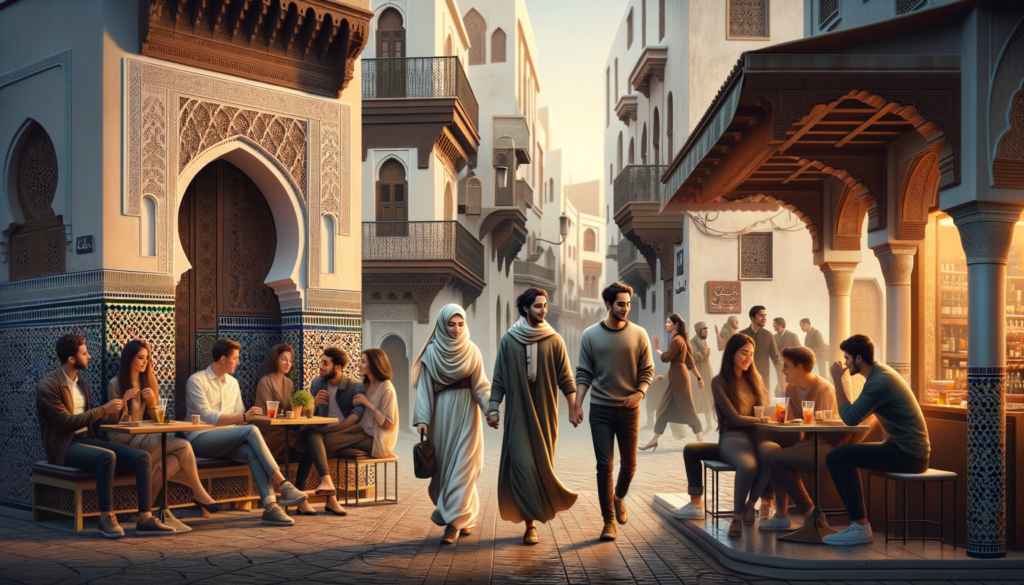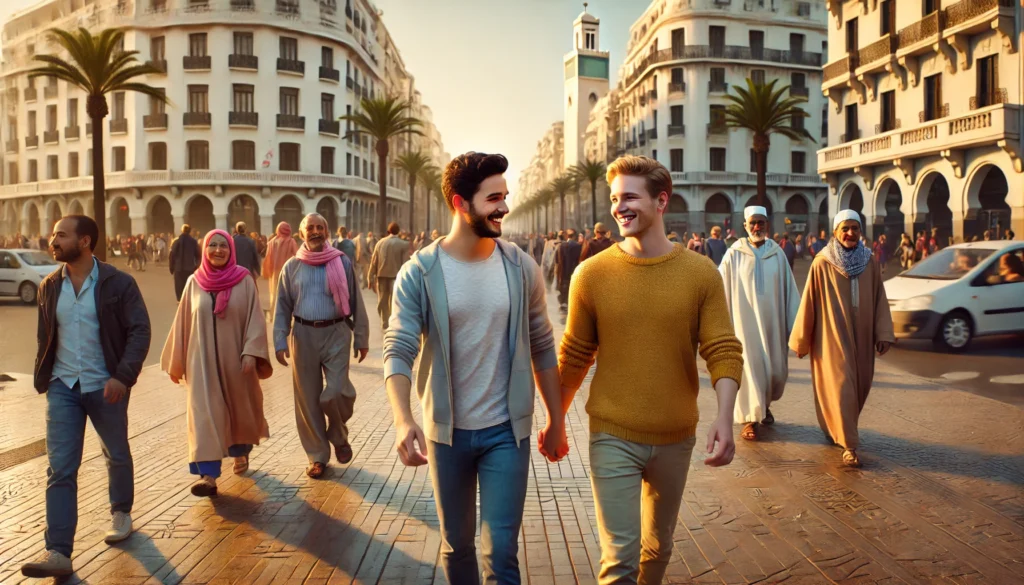
Morocco, a land of breathtaking landscapes and deep cultural roots, is a country where traditions and modernity continuously intersect. From its vibrant souks and historic medinas to its progressive reforms in some areas, Morocco showcases a fascinating duality that captivates travelers and expats alike. However, beneath the ornate tiles of this culturally rich tapestry lies a complex web of conservative social norms and rigid legal frameworks that significantly influence daily life—especially when it comes to relationships and dating.
For visitors and residents who are not intimately familiar with Moroccan laws and customs, navigating the dating scene can feel like a walk through an intricate maze. The interplay between a strict penal code and prevailing social expectations often creates unique challenges for locals, foreigners, and marginalized groups alike. This blog post aims to provide a clear and comprehensive breakdown of these legal and cultural aspects of dating in Morocco, equipping readers with the necessary context to approach relationships with respect and understanding.
The Legal Perspective
Morocco’s Penal Code and Article 490
At the heart of Morocco’s legal framework concerning relationships lies Article 490 of the Moroccan Penal Code. This law explicitly criminalizes sexual relations between unmarried individuals, with penalties ranging from one month to one year in prison. For many Moroccans, these laws are not merely dormant legal relics—they are actively upheld in certain cases, particularly when social or familial tensions arise.
Adultery Laws: A More Severe Consequence
Beyond premarital relationships, adultery carries even harsher penalties under Moroccan law. Individuals found guilty of engaging in extramarital affairs may be subject to imprisonment ranging from one to two years. Given the nature of these laws, private behavior can quickly become a matter of public and legal scrutiny, especially when accusations stem from familial disputes, community interventions, or even anonymous complaints.
Broader Implications for Dating in Morocco
The reach of these laws casts a long shadow over romantic relationships in Morocco. For unmarried couples, even cohabitating or spending time together in private spaces comes with risks, as raids or reports from neighbors can result in legal charges. It is not uncommon for individuals, particularly women, to face not only judicial repercussions but also significant social backlash in the form of damaged reputations and restricted opportunities in both personal and professional spheres.
Understanding these legal restraints is crucial for anyone looking to navigate Morocco’s dating culture responsibly. The next sections will delve into how these laws are enforced, the juxtaposition of foreign and local experiences, and the added complexities faced by diverse groups within Moroccan society.
Law Enforcement and Social Norms
The Contrast Between Legal Reality and Day-to-Day Practice
Morocco’s penal code, particularly Article 490, criminalizing premarital sexual relationships, is not enforced uniformly. This variability leads to inconsistency in how individuals experience the law. For instance, foreign tourists tend to face much lighter scrutiny in comparison to Moroccan citizens. While foreigners can often navigate romantic relationships with relative freedom, provided they maintain discretion and avoid public displays of affection, the same cannot be said for local residents.
The Experience of Moroccan Citizens
Moroccan citizens, especially women, are often subject to greater legal and societal consequences for engaging in relationships outside the bounds of marriage. In addition to legal penalties, cultural stigma plays a significant role. Women caught in such situations may face exclusion from their families, challenges in securing employment, and even isolation from their communities. These societal pressures exacerbate the challenges of dating and underscore the importance of adhering to local expectations.
The Impact of Stigma and Social Norms
Beyond the law, deeply ingrained cultural attitudes also serve as a barrier to romantic relationships. In Morocco, the idea of preserving one’s reputation is paramount. Premarital relationships often carry a stigma that could severely damage an individual’s social standing. Consequently, the risk of judgment and exclusion forces many people to conceal their relationships, creating an environment of secrecy and caution.
Specific Challenges for Diverse Groups

LGBTQ+ Individuals and the Law
The legal environment for LGBTQ+ individuals in Morocco is particularly precarious. Same-sex relationships are criminalized and can result in penalties of up to three years in prison alongside substantial fines, as per Article 489 of the Moroccan Penal Code. For members of the LGBTQ+ community, openly expressing their identity—or navigating romantic relationships—can result in severe legal repercussions. Recent high-profile enforcement cases highlight the risks, making Morocco an unsafe environment for LGBTQ+ individuals.
Social Pressures Compounding Legal Challenges
In addition to legal barriers, societal attitudes toward LGBTQ+ individuals remain overwhelmingly conservative. Homophobia is deeply rooted, and embracing a non-heteronormative identity often leads to ostracization and stigma. This reality forces many individuals to conceal their identities entirely, enduring an isolating existence for the sake of survival.
Mixed-Nationality Couples
Couples composed of one Moroccan partner and one foreign national face a distinct set of hurdles. From cultural expectations to bureaucratic obstacles, these relationships are fraught with challenges unique to their dynamic.
Challenges with Family Acceptance
Family plays a central role in Moroccan culture, and gaining approval for a foreign partner can be a daunting task. Many families adhere to traditional values and may impose significant scrutiny on such relationships, questioning the foreigner’s intentions and their commitment to Moroccan cultural norms.
Legal Considerations and Social Expectations
For mixed-nationality couples, discretion is often essential. In many cases, formalizing the relationship—through engagement or marriage—is necessary to gain broader social acceptance and avoid potential legal complications. A fiancé visa or marriage can serve as a stabilizing factor, easing both familial and legal tensions.
Navigating Dual Expectations
Moroccan partners in mixed-nationality relationships often find themselves caught between two worlds. On one hand, they may seek to accommodate the cultural openness of their foreign partner; on the other, they must stay mindful of ingrained local social norms. This balancing act is nuanced and requires mutual understanding and respect.
Navigating Relationships in Morocco as a Foreigner
Understanding Cultural Sensitivities
For foreign travelers and expatriates, dating in Morocco requires an acute understanding of the country’s cultural fabric. Moroccan society leans heavily on traditional values, so discretion and respect for local customs are paramount. Public displays of affection are considered taboo and can attract unwanted attention or even legal trouble. Behaving respectfully in public spaces can go a long way in navigating relationships successfully.
Building Trust and Respect
Moroccans value trust and mutual respect, particularly when it comes to cross-cultural relationships. Be open to learning about your Moroccan partner’s beliefs and traditions while also sharing your perspective. This type of mutual exchange fosters understanding and deepens the relationship.
Tips for Respectful Interactions
- Avoid discussing or engaging in topics that may be seen as inappropriate, especially regarding religion or politics.
- If you’re in a new relationship, take things slowly and thoughtfully. Show genuine interest in your partner’s culture and background.
- Respect modesty norms, particularly when it comes to how you dress, and adapt accordingly when spending time with your partner’s family or in social settings.
Managing Legal Risks
Foreigners navigating romantic relationships in Morocco need to be aware of the country’s strict legal framework around intimacy. While foreign tourists often face less stringent enforcement compared to local citizens, adhering to laws around relationships can prevent potential complications. Avoid venturing into risky gray areas like cohabiting without being married or potentially compromising situations in public that could be perceived negatively.
Formalizing the Relationship
For mixed couples considering a serious long-term relationship, taking steps like obtaining a fiancé visa or formalizing the relationship through legal means may ease difficulties. This is particularly relevant for Moroccan citizens who could face significant social scrutiny without such formalities in place.
Think Long-Term
If you’re looking for a meaningful connection, patience is key. Demonstrating commitment through long-term goals, such as establishing a shared future together, can help you navigate the maze of societal and familial expectations. Your Moroccan partner will likely value this approach, given the country’s cultural emphasis on family and social stability.
Conclusion
Dating in Morocco is a complex interplay of legal restrictions, social expectations, and cultural richness. For foreigners, understanding the divide between Morocco’s legal framework and social nuances is crucial to navigating relationships smoothly. Discretion, respect, and cultural sensitivity can help you build meaningful partnerships while adhering to societal norms.
However, it’s essential to acknowledge that the challenges differ widely based on one’s identity. Moroccan citizens, particularly women and LGBTQ+ individuals, often encounter harsher penalties and stigmas, which can influence the way relationships unfold. Foreigners, while afforded more leniency, are not exempt from cultural expectations or the potential risks of ignoring local customs.
Ultimately, forming a successful relationship in Morocco requires empathy, adaptability, and a willingness to respect and embrace the cultural context of your partner’s environment. By approaching dating with an informed perspective and a genuine interest in understanding Moroccan culture, you can create connections that transcend the complexities of legal and cultural barriers.
For further insights, consider exploring resources that delve deeper into the legal and cultural aspects of Moroccan society. Education and preparation are powerful tools for fostering deeper connections and navigating unfamiliar terrains.
Frequently Asked Questions About Dating in Morocco
Is dating legal in Morocco?
Dating in the sense of premarital relationships is technically illegal in Morocco. Article 490 of the Penal Code prohibits sexual relations between unmarried individuals, with penalties ranging from one month to one year in prison.
Is the law against premarital relationships strictly enforced?
The enforcement of the law prohibiting premarital relations varies. For foreign tourists, enforcement is often lenient, especially when discretion is maintained. However, Moroccan citizens—particularly women—can face severe legal and social consequences, including fines, imprisonment, and social exclusion.
How are mixed relationships (between a Moroccan and a foreigner) treated?
Mixed relationships can be complex in Morocco. While some families and communities may be accepting, there are significant social and legal hurdles. Couples often need to maintain discretion until formal steps, such as filing for a fiancé visa, are taken.
What is the situation for LGBTQ+ individuals in Morocco?
Same-sex relationships are criminalized in Morocco, with penalties including up to three years in prison and fines. This law is actively enforced, and there have been many cases of arrests and prosecutions of LGBTQ+ individuals.
Can unmarried couples share accommodations in Morocco?
Unmarried couples, especially foreign tourists, often share hotel rooms or rent apartments without significant issues, provided they avoid public displays of affection. However, Moroccan citizens may face more scrutiny in such situations.
What are the social consequences of premarital relationships for Moroccan women?
Moroccan women who engage in premarital relationships can face serious consequences that extend beyond legal penalties. They may encounter social stigma, economic hardships, difficulties finding employment, and exclusion from their communities.
Are adultery laws also enforced in Morocco?
Yes, adultery is criminalized in Morocco, with penalties ranging from one to two years in prison. These laws are enforced and apply to both married individuals who engage in extramarital affairs.
Why is the legal framework around dating so strict in Morocco?
Morocco’s legal framework regarding dating and relationships reflects the country’s strong ties to Islamic principles and cultural traditions, which emphasize the importance of marriage before engaging in sexual relations.